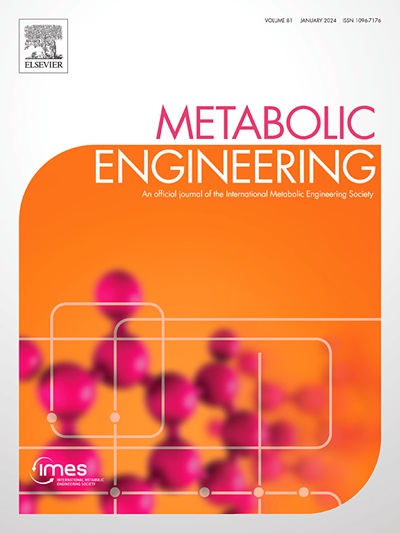Bioconversion of CO2 into valuable bioproducts via synthetic modular co-culture of engineered Chlamydomonas reinhardtii and Escherichia coli
IF 6.8
1区 生物学
Q1 BIOTECHNOLOGY & APPLIED MICROBIOLOGY
引用次数: 0
Abstract
With increasing concern over environmental problems and energy crises, interest in the biological conversion of CO2 into bioproducts is growing. Although microalgae efficiently utilize CO2, their metabolic engineering remains challenging. In contrast, while synthetic biology tools are advanced for many heterotrophic bacteria, these organisms cannot directly utilize CO2. As such, a modular co-culture system with a glycolate dehydrogenase 1 (GYD1) deficient Chlamydomonas reinhardtii mutant and Escherichia coli was developed. The GYD1 mutant secretes glycolic acid via photorespiration, which E. coli metabolizes via the glyoxylate cycle. E. coli growth was improved by implementing two-stage continuous systems to 2.0 mg L−1 h−1 on CO2. The production of green fluorescent protein (0.52 ng L−1 h−1) and lycopene (6.3 μg L−1 h−1) was also demonstrated. This study represents a successful case of a synthetic modular co-culture with a microalga and a heterotrophic bacterium, potentially contributing to sustainable industrial processes and reducing environmental impact.

通过合成模块化共培养工程莱茵衣藻和大肠杆菌将二氧化碳转化为有价值的生物产品。
随着人们对环境问题和能源危机的日益关注,人们对二氧化碳生物转化为生物产品的兴趣日益浓厚。虽然微藻能有效利用二氧化碳,但其代谢工程仍然具有挑战性。相比之下,虽然许多异养细菌的合成生物学工具很先进,但这些生物不能直接利用二氧化碳。因此,开发了一种具有glycolate脱氢酶1 (GYD1)缺陷的莱茵衣单胞菌突变体和大肠杆菌的模块化共培养体系。GYD1突变体通过光呼吸分泌乙醇酸,大肠杆菌通过乙醛酸循环代谢乙醇酸。在2.0 mg L-1 h-1的CO2条件下,采用两级连续体系可提高大肠杆菌的生长。还证实了绿色荧光蛋白(0.52 ng L-1 h-1)和番茄红素(6.3 μg L-1 h-1)的产生。本研究是微藻和异养细菌合成模块化共培养的成功案例,可能有助于可持续工业过程和减少对环境的影响。
本文章由计算机程序翻译,如有差异,请以英文原文为准。
求助全文
约1分钟内获得全文
求助全文
来源期刊

Metabolic engineering
工程技术-生物工程与应用微生物
CiteScore
15.60
自引率
6.00%
发文量
140
审稿时长
44 days
期刊介绍:
Metabolic Engineering (MBE) is a journal that focuses on publishing original research papers on the directed modulation of metabolic pathways for metabolite overproduction or the enhancement of cellular properties. It welcomes papers that describe the engineering of native pathways and the synthesis of heterologous pathways to convert microorganisms into microbial cell factories. The journal covers experimental, computational, and modeling approaches for understanding metabolic pathways and manipulating them through genetic, media, or environmental means. Effective exploration of metabolic pathways necessitates the use of molecular biology and biochemistry methods, as well as engineering techniques for modeling and data analysis. MBE serves as a platform for interdisciplinary research in fields such as biochemistry, molecular biology, applied microbiology, cellular physiology, cellular nutrition in health and disease, and biochemical engineering. The journal publishes various types of papers, including original research papers and review papers. It is indexed and abstracted in databases such as Scopus, Embase, EMBiology, Current Contents - Life Sciences and Clinical Medicine, Science Citation Index, PubMed/Medline, CAS and Biotechnology Citation Index.
 求助内容:
求助内容: 应助结果提醒方式:
应助结果提醒方式:


